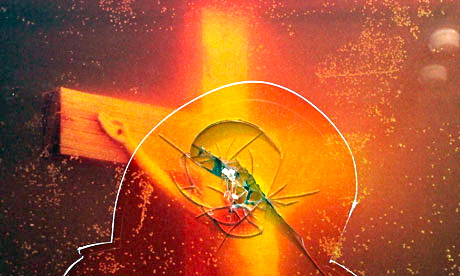Let’s face it. Evangelicals are a pretty grumpy lot when it comes to the arts and culture. We’re perpetually on the lookout for artistic evidence to prove that this is the most evil of generations. In fact, it seems as if many of us delight in being offended so that we can crow about the good old days when the Church was the patron of the arts and collectively bemoan the consequences of the Enlightenment.
We like our art and culture obvious to interpret and easy to use, either as a theological weapon or as a target for our theological weapons. When we hear the word “culture,” we usually reach for our Bibles. And there we search for commands that tell us what we shouldn’t do, eat, touch, or look at when it comes to the arts. Our approach to culture is thus predominately negative and reactionary.
This is a heavy burden to bear. And so it’s understandable that we’re a little foggy on what to enjoy, or even if a Christian is supposed to “enjoy” art and culture at all. So, we tiptoe gingerly around it, limiting its use to covert evangelistic or political ops or as overt didactic tools to shape virtue and affirm bourgeois morality. A trip to the library, museum, concert hall, or film theatre can become an occasion for worry and hand-wringing about what is “appropriate.”
The most progressive of us avoid the problem altogether by claiming to make our own art and culture. We dream of producing Christian artists, filmmakers, writers, and the like who can “take back” the culture, redeem it, transform it, or otherwise do something to it.
But the world does not need more (or any) “Christian artists.”
What the world does need, and needs desperately, are Christians who embrace our freedom in Christ to such a degree that we can listen to and participate in the art and culture that is at hand. What the world needs are fewer makers, doers, and theorizers and more receivers. The world needs us to pay attention to the insightful art, music, film, and poetry that’s already out there. We need to rediscover our freedom to receive the art and culture that our neighbors are producing. The world desperately needs us to live out of the grace that God gives to the Jews in Babylon—to build houses, plant gardens, have families, and seek the welfare of the city (Jer 29: 4-9)—to live not as righteous cultural judges, but as broken sinners bearing witness with the arts to God’s sustaining grace amidst the city. This frees us from the cultural burdens we so often carry in order to love our artistic neighbors by loving their art, poetry, music, and film. We are free to make ourselves vulnerable to it, allowing it to work on us as art (not as moral messages or threats to our morality). And we are free to mobilize our faith in loving service to that work of art, that painting, that film, that novel, or that poem in order to deepen our understanding of it and to open its depth for others, even (and especially) those who do not share our faith.
The Christian is the ideal audience for all art, for all aesthetic artifacts of the imagination—even (or especially) the most scandalous and offensive. It is often the most scandalous and offensive works that reveal the pain, suffering, and desperation of the human condition in the most compelling of ways. And it is the Christian who can receive all things—including poems and paintings—as gifts. It is the Christian who can hear the echoes of grace that are often present in them. It is the Christian who sees God at work in the world through artists, writers, and filmmakers, who produce artifacts that often contradict their own beliefs, artifacts that strain toward Christ, like trees on a mountain bending toward the warmth of the sun.
Every work of art yearns for a viewer, a reader, a hearer who confesses, “all things were created through him and for him…and in him all things hold together” (Col. 1: 16;17).
And every painting desires a viewer who receives the world not only as creation and gift, but also as promise.
That is the foundation for Christian witness in culture. And it is the source of our freedom.












